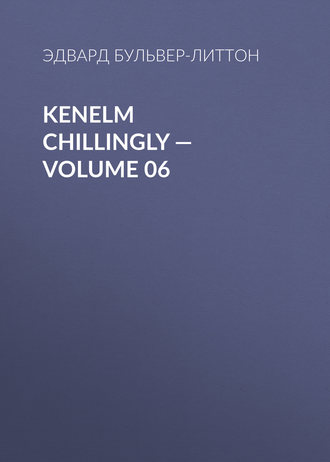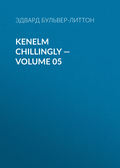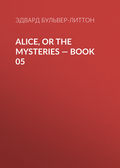
Эдвард Бульвер-Литтон
Kenelm Chillingly — Volume 06
CHAPTER VI
THE dinner-party at Mr. Braefield's was not quite so small as Kenelm had anticipated. When the merchant heard from his wife that Kenelm was coming, he thought it would be but civil to the young gentleman to invite a few other persons to meet him.
"You see, my dear," he said to Elsie, "Mrs. Cameron is a very good, simple sort of woman, but not particularly amusing; and Lily, though a pretty girl, is so exceedingly childish. We owe much, my sweet Elsie, to this Mr. Chillingly,"—here there was a deep tone of feeling in his voice and look,—"and we must make it as pleasant for him as we can. I will bring down my friend Sir Thomas, and you ask Mr. Emlyn and his wife. Sir Thomas is a very sensible man, and Emlyn a very learned one. So Mr. Chillingly will find people worth talking to. By the by, when I go to town I will send down a haunch of venison from Groves's."
So when Kenelm arrived, a little before six o'clock, he found in the drawing-room the Rev. Charles Emlyn, vicar of Moleswich proper, with his spouse, and a portly middle-aged man, to whom, as Sir Thomas Pratt, Kenelm was introduced. Sir Thomas was an eminent city banker. The ceremonies of introduction over, Kenelm stole to Elsie's side.
"I thought I was to meet Mrs. Cameron. I don't see her."
"She will be here presently. It looks as if it might rain, and I have sent the carriage for her and Lily. Ah, here they are!"
Mrs. Cameron entered, clothed in black silk. She always wore black; and behind her came Lily, in the spotless colour that became her name; no ornament, save a slender gold chain to which was appended a single locket, and a single blush rose in her hair. She looked wonderfully lovely; and with that loveliness there was a certain nameless air of distinction, possibly owing to delicacy of form and colouring; possibly to a certain grace of carriage, which was not without a something of pride.
Mr. Braefield, who was a very punctual man, made a sign to his servant, and in another moment or so dinner was announced. Sir Thomas, of course, took in the hostess; Mr. Braefield, the vicar's wife (she was a dean's daughter); Kenelm, Mrs. Cameron; and the vicar, Lily.
On seating themselves at the table Kenelm was on the left hand, next to the hostess, and separated from Lily by Mrs. Cameron and Mr. Emlyn; and when the vicar had said grace, Lily glanced behind his back and her aunt's at Kenelm (who did the same thing), making at him what the French call a /moue/. The pledge to her had been broken. She was between two men very much grown up,—the vicar and the host. Kenelm returned the /moue/ with a mournful smile and an involuntary shrug.
All was silent till, after his soup and his first glass of sherry, Sir Thomas began,—
"I think, Mr. Chillingly, we have met before, though I had not the honour then of making your acquaintance." Sir Thomas paused before he added, "Not long ago; the last State ball at Buckingham Palace."
Kenelm bent his head acquiescingly. He had been at that ball.
"You were talking with a very charming woman,—a friend of mine,—Lady Glenalvon."
(Sir Thomas was Lady Glenalvon's banker.)
"I remember perfectly," said Kenelm. "We were seated in the picture gallery. You came to speak to Lady Glenalvon, and I yielded to you my place on the settee."
"Quite true; and I think you joined a young lady, very handsome,—the great heiress, Miss Travers."
Kenelm again bowed, and, turning away as politely as he could, addressed himself to Mrs. Cameron. Sir Thomas, satisfied that he had impressed on his audience the facts of his friendship with Lady Glenalvon and his attendance at the court ball, now directed his conversational powers towards the viear, who, utterly foiled in the attempt to draw out Lily, met the baronet's advances with the ardour of a talker too long suppressed. Kenelm continued, unmolested, to ripen his acquaintance with Mrs. Cameron. She did not, however, seem to lend a very attentive ear to his preliminary commonplace remarks about scenery or weather, but at his first pause, said,—
"Sir Thomas spoke about a Miss Travers: is she related to a gentleman who was once in the Guards, Leopold Travers?"
"She is his daughter. Did you ever know Leopold Travers?"
"I have heard him mentioned by friends of mine long ago,—long ago," replied Mrs. Cameron with a sort of weary languor, not unwonted, in her voice and manner; and then, as if dismissing the bygone reminiscence from her thoughts, changed the subject.
"Lily tells me, Mr. Chillingly, that you said you were staying at Mr.
Jones's, Cromwell Lodge. I hope you are made comfortable there."
"Very. The situation is singularly pleasant."
"Yes, it is considered the prettiest spot on the brook-side, and used to be a favourite resort for anglers; but the trout, I believe, are growing scarce; at least, now that the fishing in the Thames is improved, poor Mr. Jones complains that his old lodgers desert him. Of course you took the rooms for the sake of the fishing. I hope the sport may be better than it is said to be."
"It is of little consequence to me: I do not care much about fishing; and since Miss Mordaunt calls the book which first enticed me to take to it 'a cruel one,' I feel as if the trout had become as sacred as crocodiles were to the ancient Egyptians."
"Lily is a foolish child on such matters. She cannot bear the thought of giving pain to any dumb creature; and just before our garden there are a few trout which she has tamed. They feed out of her hand; she is always afraid they will wander away and get caught."
"But Mr. Melville is an angler?"
"Several years ago he would sometimes pretend to fish, but I believe it was rather an excuse for lying on the grass and reading 'the cruel book,' or perhaps, rather, for sketching. But now he is seldom here till autumn, when it grows too cold for such amusement."
Here Sir Thomas's voice was so loudly raised that it stopped the conversation between Kenelm and Mrs. Cameron. He had got into some question of politics on which he and the vicar did not agree, and the discussion threatened to become warm, when Mrs. Braefield, with a woman's true tact, broached a new topic, in which Sir Thomas was immediately interested, relating to the construction of a conservatory for orchids that he meditated adding to his country-house, and in which frequent appeal was made to Mrs. Cameron, who was considered an accomplished florist, and who seemed at some time or other in her life to have acquired a very intimate acquaintance with the costly family of orchids.
When the ladies retired Kenelm found himself seated next to Mr. Emlyn, who astounded him by a complimentary quotation from one of his own Latin prize poems at the university, hoped he would make some stay at Moleswich, told him of the principal places in the neighbourhood worth visiting, and offered him the run of his library, which he flattered himself was rather rich, both in the best editions of Greek and Latin classics and in early English literature. Kenelm was much pleased with the scholarly vicar, especially when Mr. Emlyn began to speak about Mrs. Cameron and Lily. Of the first he said, "She is one of those women in whom quiet is so predominant that it is long before one can know what undercurrents of good feeling flow beneath the unruffled surface. I wish, however, she was a little more active in the management and education of her niece,—a girl in whom I feel a very anxious interest, and whom I doubt if Mrs. Cameron understands. Perhaps, however, only a poet, and a very peculiar sort of poet, can understand her: Lily Mordaunt is herself a poem."
"I like your definition of her," said Kenelm. "There is certainly something about her which differs much from the prose of common life."
"You probably know Wordsworth's lines:
"' . . . and she shall lean her ear
In many a secret place
Where rivulets dance their wayward round,
And beauty, born of murmuring sound,
Shall pass into her face.'
"They are lines that many critics have found unintelligible; but Lily seems like the living key to them."
Kenelm's dark face lighted up, but he made no answer.
"Only," continued Mr. Emlyn, "how a girl of that sort, left wholly to herself, untrained, undisciplined, is to grow up into the practical uses of womanhood, is a question that perplexes and saddens me."
"Any more wine?" asked the host, closing a conversation on commercial matters with Sir Thomas. "No?—shall we join the ladies?"
CHAPTER VII
THE drawing-room was deserted; the ladies were in the garden. As Kenelm and Mr. Emlyn walked side by side towards the group (Sir Thomas and Mr. Braefield following at a little distance), the former asked, somewhat abruptly, "What sort of man is Miss Cameron's guardian, Mr. Melville?"
"I can scarcely answer that question. I see little of him when he comes here. Formerly, he used to run down pretty often with a harum-scarum set of young fellows, quartered at Cromwell Lodge,—Grasmere had no accommodation for them,—students in the Academy, I suppose. For some years he has not brought those persons, and when he does come himself it is but for a few days. He has the reputation of being very wild."
Further conversation was here stopped. The two men, while they thus talked, had been diverging from the straight way across the lawn towards the ladies, turning into sequestered paths through the shrubbery; now they emerged into the open sward, just before a table, on which coffee was served, and round which all the rest of the party were gathered.
"I hope, Mr. Emlyn," said Elsie's cheery voice, "that you have dissuaded Mr. Chillingly from turning Papist. I am sure you have taken time enough to do so."
Mr. Emlyn, Protestant every inch of him, slightly recoiled from Kenelm's side. "Do you meditate turning—" He could not conclude the sentence.
"Be not alarmed, my dear sir. I did but own to Mrs. Braefield that I had paid a visit to Oxford in order to confer with a learned man on a question that puzzled me, and as abstract as that feminine pastime, theology, is now-a-days. I cannot convince Mrs. Braefield that Oxford admits other puzzles in life than those which amuse the ladies." Here Kenelm dropped into a chair by the side of Lily.
Lily half turned her back to him.
"Have I offended again?"
Lily shrugged her shoulders slightly and would not answer.
"I suspect, Miss Mordaunt, that among your good qualities, nature has omitted one; the bettermost self within you should replace it."
Lily here abruptly turned to him her front face: the light of the skies was becoming dim, but the evening star shone upon it.
"How! what do you mean?"
"Am I to answer politely or truthfully?"
"Truthfully! Oh, truthfully! What is life without truth?"
"Even though one believes in fairies?"
"Fairies are truthful, in a certain way. But you are not truthful.
You were not thinking of fairies when you—"
"When I what?"
"Found fault with me."
"I am not sure of that. But I will translate to you my thoughts, so far as I can read them myself, and to do so I will resort to the fairies. Let us suppose that a fairy has placed her changeling into the cradle of a mortal: that into the cradle she drops all manner of fairy gifts which are not bestowed on mere mortals; but that one mortal attribute she forgets. The changeling grows up; she charms those around her: they humour, and pet, and spoil her. But there arises a moment in which the omission of the one mortal gift is felt by her admirers and friends. Guess what that is."
Lily pondered. "I see what you mean; the reverse of truthfulness, politeness."
"No, not exactly that, though politeness slides into it unawares: it is a very humble quality, a very unpoetic quality; a quality that many dull people possess; and yet without it no fairy can fascinate mortals, when on the face of the fairy settles the first wrinkle. Can you not guess it now?"
"No: you vex me; you provoke me;" and Lily stamped her foot petulantly, as in Kenelm's presence she had stamped it once before. "Speak plainly, I insist."
"Miss Mordaunt, excuse me: I dare not," said Kenelm, rising with a sort of bow one makes to the Queen; and he crossed over to Mrs. Braefield.
Lily remained, still pouting fiercely.
Sir Thomas took the chair Kenelm had vacated.
CHAPTER VIII
THE hour for parting came. Of all the guests, Sir Thomas alone stayed at the house a guest for the night. Mr. and Mrs. Emlyn had their own carriage. Mrs. Braefield's carriage came to the door for Mrs. Cameron and Lily.
Said Lily, impatiently and discourteously, "Who would not rather walk on such a night?" and she whispered to her aunt.
Mrs. Cameron, listening to the whisper and obedient to every whim of Lily's, said, "You are too considerate, dear Mrs. Braefield; Lily prefers walking home; there is no chance of rain now."
Kenelm followed the steps of the aunt and niece, and soon overtook them on the brook-side.
"A charming night, Mr. Chillingly," said Mrs. Cameron.
"An English summer night; nothing like it in such parts of the world as I have visited. But, alas! of English summer nights there are but few."
"You have travelled much abroad?"
"Much, no, a little; chiefly on foot."
Lily hitherto had not said a word, and had been walking with downcast head. Now she looked up and said, in the mildest and most conciliatory of human voices,—
"You have been abroad;" then, with an acquiescence in the manners of the world which to him she had never yet manifested, she added his name, "Mr. Chillingly," and went on, more familiarly. "What a breadth of meaning the word 'abroad' conveys! Away, afar from one's self, from one's everyday life. How I envy you! you have been abroad: so has Lion" (here drawing herself up), "I mean my guardian, Mr. Melville."
"Certainly, I have been abroad, but afar from myself—never. It is an old saying,—all old sayings are true; most new sayings are false,—a man carries his native soil at the sole of his foot."
Here the path somewhat narrowed. Mrs. Cameron went on first, Kenelm and Lily behind; she, of course, on the dry path, he on the dewy grass.
She stopped him. "You are walking in the wet, and with those thin shoes." Lily moved instinctively away from the dry path.
Homely though that speech of Lily's be, and absurd as said by a fragile girl to a gladiator like Kenelm, it lit up a whole world of womanhood: it showed all that undiscoverable land which was hidden to the learned Mr. Emlyn, all that land which an uncomprehended girl seizes and reigns over when she becomes wife and mother.
At that homely speech, and that impulsive movement, Kenelm halted, in a sort of dreaming maze. He turned timidly, "Can you forgive me for my rude words? I presumed to find fault with you."
"And so justly. I have been thinking over all you said, and I feel you were so right; only I still do not quite understand what you meant by the quality for mortals which the fairy did not give to her changeling."
"If I did not dare say it before, I should still less dare to say it now."
"Do." There was no longer the stamp of the foot, no longer the flash from her eyes, no longer the wilfulness which said, "I insist;"—" Do;" soothingly, sweetly, imploringly.
Thus pushed to it, Kenelm plucked up courage, and not trusting himself to look at Lily, answered brusquely,—
"The quality desirable for men, but more essential to women in proportion as they are fairy-like, though the tritest thing possible, is good temper."
Lily made a sudden bound from his side, and joined her aunt, walking through the wet grass.
When they reached the garden-gate, Kenelm advanced and opened it.
Lily passed him by haughtily; they gained the cottage-door.
"I don't ask you in at this hour," said Mrs. Cameron. "It would be but a false compliment."
Kenelm bowed and retreated. Lily left her aunt's side, and came towards him, extending her hand.
"I shall consider your words, Mr. Chillingly," she said, with a strangely majestic air. "At present I think you are not right. I am not ill-tempered; but—" here she paused, and then added with a loftiness of mien which, had she not been so exquisitely pretty, would have been rudeness—"in any case I forgive you."
CHAPTER IX
THERE were a good many pretty villas in the outskirts of Moleswich, and the owners of them were generally well off, and yet there was little of what is called visiting society; owing perhaps to the fact that there not being among these proprietors any persons belonging to what is commonly called "the aristocratic class," there was a vast deal of aristocratic pretension. The family of Mr. A——-, who had enriched himself as a stock-jobber, turned up its nose at the family of Mr. B——-, who had enriched himself still more as a linen-draper, while the family of Mr. B——- showed a very cold shoulder to the family of Mr. C——-, who had become richer than either of them as a pawnbroker, and whose wife wore diamonds, but dropped her h's. England would be a community so aristocratic that there would be no living in it, if one could exterminate what is now called "aristocracy." The Braefields were the only persons who really drew together the antagonistic atoms of the Moleswich society, partly because they were acknowledged to be the first persons there, in right not only of old settlement (the Braefields had held Braefieldville for four generations), but of the wealth derived from those departments of commercial enterprise which are recognized as the highest, and of an establishment considered to be the most elegant in the neighbourhood; principally because Elsie, while exceedingly genial and cheerful in temper, had a certain power of will (as her runaway folly had manifested), and when she got people together compelled them to be civil to each other. She had commenced this gracious career by inaugurating children's parties, and when the children became friends the parents necessarily grew closer together. Still her task had only recently begun, and its effects were not in full operation. Thus, though it became known at Moleswich that a young gentleman, the heir to a baronetcy and a high estate, was sojourning at Cromwell Lodge, no overtures were made to him on the part of the A's, B's, and C's. The vicar, who called on Kenelm the day after the dinner at Braefieldville, explained to him the social conditions of the place. "You understand," said he, "that it will be from no want of courtesy on the part of my neighbours if they do not offer you any relief from the pleasures of solitude. It will be simply because they are shy, not because they are uncivil. And, it is this consideration that makes me, at the risk of seeming too forward, entreat you to look into the vicarage any morning or evening on which you feel tired of your own company; suppose you drink tea with us this evening,—you will find a young lady whose heart you have already won."
"Whose heart I have won!" faltered Kenelm, and the warm blood rushed to his cheek.
"But," continued the vicar, smiling, "she has no matrimonial designs on you at present. She is only twelve years old,—my little girl Clemmy."
"Clemmy!—she is your daughter? I did not know that. I very gratefully accept your invitation."
"I must not keep you longer from your amusement. The sky is just clouded enough for sport. What fly do you use?"
"To say truth, I doubt if the stream has much to tempt me in the way of trout, and I prefer rambling about the lanes and by-paths to
"'The noiseless angler's solitary stand.'
"I am an indefatigable walker, and the home scenery round the place has many charms for me. Besides," added Kenelm, feeling conscious that he ought to find some more plausible excuse than the charms of home scenery for locating himself long in Cromwell Lodge, "besides, I intend to devote myself a good deal to reading. I have been very idle of late, and the solitude of this place must be favourable to study."
"You are not intended, I presume, for any of the learned professions?"
"The learned professions," replied Kenelm, "is an invidious form of speech that we are doing our best to eradicate from the language. All professions now-a-days are to have much about the same amount of learning. The learning of the military profession is to be levelled upwards, the learning of the scholastic to be levelled downwards. Cabinet ministers sneer at the uses of Greek and Latin. And even such masculine studies as Law and Medicine are to be adapted to the measurements of taste and propriety in colleges for young ladies. No, I am not intended for any profession; but still an ignorant man like myself may not be the worse for a little book-reading now and then."
"You seem to be badly provided with books here," said the vicar, glancing round the room, in which, on a table in the corner, lay half-a-dozen old-looking volumes, evidently belonging not to the lodger but to the landlord. "But, as I before said, my library is at your service. What branch of reading do you prefer?"
Kenelm was, and looked, puzzled. But after a pause he answered:
"The more remote it be from the present day, the better for me. You said your collection was rich in mediaeval literature. But the Middle Ages are so copied by the modern Goths, that I might as well read translations of Chaucer or take lodgings in Wardour Street. If you have any books about the manners and habits of those who, according to the newest idea in science, were our semi-human progenitors in the transition state between a marine animal and a gorilla, I should be very much edified by the loan."
"Alas," said Mr. Emlyn, laughing, "no such books have been left to us."
"No such books? You must be mistaken. There must be plenty of them somewhere. I grant all the wonderful powers of invention bestowed on the creators of poetic romance; still not the sovereign masters in that realm of literature—not Scott, not Cervantes, not Goethe, not even Shakspeare—could have presumed to rebuild the past without such materials as they found in the books that record it. And though I, no less cheerfully, grant that we have now living among us a creator of poetic romance immeasurably more inventive than they,—appealing to our credulity in portents the most monstrous, with a charm of style the most conversationally familiar,—still I cannot conceive that even that unrivalled romance-writer can so bewitch our understandings as to make us believe that, if Miss Mordaunt's cat dislikes to wet her feet, it is probably because in the prehistoric age her ancestors lived in the dry country of Egypt; or that when some lofty orator, a Pitt or a Gladstone, rebuts with a polished smile which reveals his canine teeth the rude assault of an opponent, he betrays his descent from a 'semi-human progenitor' who was accustomed to snap at his enemy. Surely, surely there must be some books still extant written by philosophers before the birth of Adam, in which there is authority, even though but in mythic fable, for such poetic inventions. Surely, surely some early chroniclers must depose that they saw, saw with their own eyes, the great gorillas who scratched off their hairy coverings to please the eyes of the young ladies of their species, and that they noted the gradual metamorphosis of one animal into another. For, if you tell me that this illustrious romance-writer is but a cautious man of science, and that we must accept his inventions according to the sober laws of evidence and fact, there is not the most incredible ghost story which does not better satisfy the common sense of a sceptic. However, if you have no such books, lend me the most unphilosophical you possess,—on magic, for instance,—the philosopher's stone"—
"I have some of them," said the vicar, laughing; "you shall choose for yourself."
"If you are going homeward, let me accompany you part of the way: I don't yet know where the church and the vicarage are, and I ought to know before I come in the evening."
Kenelm and the vicar walked side by side, very sociably, across the bridge and on the side of the rivulet on which stood Mrs. Cameron's cottage. As they skirted the garden pale at the rear of the cottage, Kenelm suddenly stopped in the middle of some sentence which had interested Mr. Emlyn, and as suddenly arrested his steps on the turf that bordered the lane. A little before him stood an old peasant woman, with whom Lily, on the opposite side of the garden pale, was conversing. Mr. Emlyn did not at first see what Kenelm saw; turning round rather to gaze on his companion, surprised by his abrupt halt and silence. The girl put a small basket into the old woman's hand, who then dropped a low curtsy, and uttered low a "God bless you." Low though it was, Kenelm overheard it, and said abstractedly to Mr. Emlyn, "Is there a greater link between this life and the next than God's blessing on the young, breathed from the lips of the old?"







